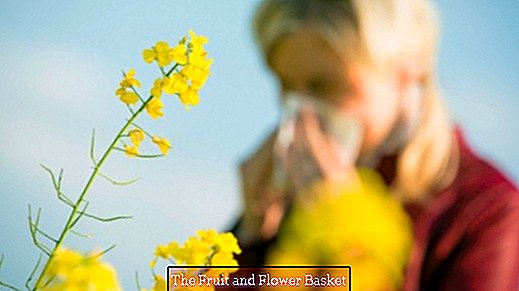Home remedies for hay fever and pollen allergy
Symptoms and cause
About 25 percent of Germans suffer from hay fever. The disease described by the medical profession as "pollinosis" or "allergic rhinitis" leads to watery eyes, runny nose, sneezing and respiratory problems. These annoying symptoms are often accompanied by a general fatigue. In severe cases, skin eczema and asthma attacks may be added. The cause of these complaints lies in an exaggerated reaction of the body's immune system to flying bee pollen. Assuming that these are "enemy" invaders, the immune system causes a release of the hormone histamine. The body responds to histamine overproduction with the already mentioned annoying (in some cases even dangerous) allergic reactions.
Reduced quality of life soon all year round?
The quality of life of those affected is often severely limited. Those who are allergic to birch, hazelnut, grasses and the like can not enjoy the best months of the year outdoors. In addition, the limitations of hay fever can have a negative impact on education and career performance. Nature leaves allergy sufferers hardly any respite. Benefiting from climate change, the pollen season has steadily shifted forward. It often starts in January and can last until October.
Alternatives to nasal sprays and tablets
Parallel to the spread of hay fever, the pharmaceutical market has adapted to the needs and offers chemical remedies. Sprays and tablets are among the daily companions for most sufferers. They usually help quickly and usually no longer have the sedative effect of previous preparations. For those looking for an alternative (or supplement) to daily medication, the following tips may be helpful:
- Nasal rinse with saline: To remove pollen from the nose and to disinfect the mucous membranes, the nose can be rinsed with a solution of a level teaspoon of cooking salt and 200 ml of lukewarm water. Helpful here are special "Nasenduschen" (pharmacy or drugstore).
- Eucalyptus oil: The ingredients of eucalyptus have a plant-based cortisone-like effect. To make even nose drops, eucalyptus oil is mixed with a high quality cooking oil. With a cotton swab the solution can be applied to the nasal walls. Even as a bath additive, eucalyptus oil can develop its effect well. To do this, mix ten drops of the oil with five tablespoons of cooking oil and add the mixture to the bathwater.
- Eyebright: For irritated, itchy and watery eyes helps a compress with eyebright. From the herb available in the pharmacy or health food shop, a cup of tea is prepared to order. Immerse two sterile eye compresses (pharmacy) in the lukewarm tea and put on the eyes relieves the discomfort.
- nettle: The cause of allergy symptoms is the hormone histamine. Natural substances in the stinging nettle block the release of the hormone and can reduce the discomfort. Teas or tinctures of nettles can be made. If you do not like the otherwise healthy herb, you can use nettle capsules from the pharmacy.
Useful everyday tips
The most effective way to prevent an allergy boost is to avoid the triggering allergens. Of course, this is in many cases practically unworkable. But here, too, there are a number of behavioral measures to reduce the inhalation of pollen as much as possible.
- Ventilate at the right time: In rural areas, pollen count is highest in the morning between five and six o'clock, in cities all morning. Therefore, the windows should remain closed during these times.
- No fan: When using a fan deposited allergens are whirled up and there is pollen in the apartment.
- Car window: Car windows should always be closed while driving. Additional pollen filters in the ventilation system can usually be retrofitted.
- Wash hair: Pollen settles in the hair during the day. Washing hair at bedtime prevents it from getting into bed and disturbing sleep.
- Outsource clothes: Just like the hair, the clothes are pollen-laden in the evening. Therefore: Wash clothing as often as possible and never put it down unwashed in the bedroom.
Hopefully, these tips will help all those suffering from hay fever and allergy. If you still know one or the other home remedy on this subject, a supplement is always welcome.





